South Sudan Reports
The Criminalization of South Sudan’s Gold Sector: Kleptocratic Networks and the Gold Trade in Kapoeta
Read the full report. By the Enough Project team Within the area historically known as the state of Eastern Equatoria, Kapoeta is a semi-arid rangeland of clay soil dotted with short, thorny shrubs and other vegetation. Precious resources lie below this desolate landscape. Eastern Equatoria, along with the region historically known as Central Equatoria, contains some of the most important and best-known sites for artisanal and small-scale gold mining (ASM). Some estimates put the number of miners at 60,000 working at 80 different locations in the area, including Nanaknak, Lauro (Didinga Hills), Napotpot, and Namurnyang. Locals primarily use traditional mining ...
Safeguards to Peace: Steps Toward Governance in South Sudan
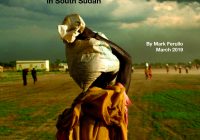
Download the full report. By Mark Ferullo Executive Summary Hundreds of thousands killed,[i] injured, and raped.[ii] Millions more displaced.[iii] After five years of violence in South Sudan, the peace agreement signed in September 2018 is a hopeful attempt to end the corruption-fueled war. [iv] But this is an uncertain time in South Sudan. The overall commitment to the peace agreement is low and implementation of some key provisions of the agreement has stalled completely. At the same time, President Salva Kiir continues to control South Sudan’s violent kleptocratic system of government that has deliberately constructed an infrastructure for corruption and ...
A Hijacked State: Violent Kleptocracy in South Sudan
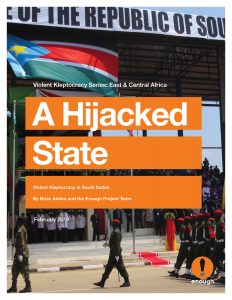
Download the full report. By Brian Adeba and the Enough Project Team Executive Summary On September 12, 2018, the South Sudanese government and the armed opposition signed a peace deal that could potentially end the 5-year-old conflict, if elites exercise the political will required to implement the agreement. The South Sudanese conflict is rooted in the violent kleptocratic system of governance that the ruling Sudan People’s Liberation Movement (SPLM) began building in 2005, after the end of the Second Sudanese Civil War (1983–2005). When President Salva Kiir became the chair of the SPLM and the leader of the autonomous Government of ...
Breaking Out of the Spiral in South Sudan: Anti-Money Laundering, Network Sanctions, and a New Peacemaking Architecture
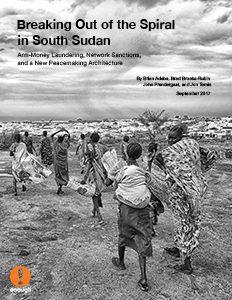
The metastasizing crisis in South Sudan requires a new strategy for achieving a sustainable peace. Conditions on the ground are unbearable for large swathes of South Sudan’s population, and regional peacemaking efforts are not delivering results ...
Enough Forum: A Way Out? Models for negotiating an exit plan for entrenched leadership in South Sudan
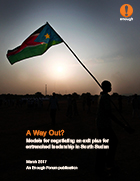
The Enough Forum is a platform for dynamic discourse engaging critical issues, challenges, and questions among thought leaders, field researchers, and policy experts. Opinions and statements herein are those of the authors and participants in the forum, and do not necessarily reflect the opinion or policy recommendations of the Enough Project ...
How The World’s Newest Country Went Awry: South Sudan’s war, famine, and potential genocide
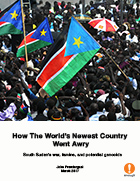
War has been hell for South Sudan’s people, but it has been very lucrative for the country’s leaders and commercial collaborators, South Sudan’s war profiteers ...
Weapons of Mass Corruption: How corruption in South Sudan’s military undermines the world’s newest country

“Weapons of Mass Corruption” is the fifth in a series of in-depth, field research-driven reports on the dynamics of profit and power fueling war in the Horn, East and Central Africa. Violent kleptocracies dominate the political landscape of this region, leading to protracted conflicts marked by the commission of mass atrocities by state and non-state actors. Enough's Political Economy of African Wars series will focus on the key players in these conflicts, their motivations, how they benefit from the evolving war economies, and what policies might be most effective in changing the calculations of those orchestrating the violence–including both incentives ...
Testimony of Brian Adeba – “The Growing Crisis in South Sudan”
Testimony of Brian Adeba, Associate Director of Policy, before the House Foreign Affairs Committee, Subcommittee on Africa, Global Health, Global Human Rights, and International Organizations' hearing on “The Growing Crisis in South Sudan,” given on September 7, 2016 ...
A Hope from Within? Countering the intentional destruction of governance and transparency in South Sudan
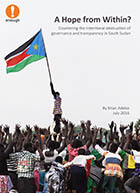
In April 2016, after considerable foot-dragging, opposition, and obstacles, the two main parties to the conflict in South Sudan that erupted in December 2013 formed a transitional government as mandated in the August 2015 peace agreement. Sustainable peace in South Sudan will continue to be elusive unless leaders make profound and fundamental changes to establish accountability and end impunity ...
Enough Project Statement: Stolen Assets Must be Returned to the South Sudanese People
Recently, the president of South Sudan, Salva Kiir, called for global support to recover assets stolen by South Sudanese elites and deposited into foreign bank accounts or spent on purchasing properties in foreign countries. This is not the first time President Kiir has expressed a desire to tackle elite corruption in his country. In past cases, however, there has been no effective follow through, leaving the situation unchanged and the stolen assets in the hands of those who stole them ...

